The Contents are specified on the Label
Anybody wanting to shop sustainably can rely on the Migros product labels. A lot changed in the Bio programme last year. Migros is offering an ever larger range at affordable prices.
Migros Bio
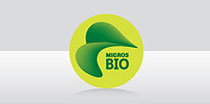
Bio stands for sustainable agriculture for the benefit of mankind and nature. The range of Migros Bio produce includes 1'000 products. In 2010 numerous additions were made, such as various groceries, dairy products and cheese, meat and cold cuts, as well as bakery products. With significant price reductions – for some products by more than 10 per cent – Migros is making Bio produce accessible to all customer groups. The Migros Bio logo was redesigned last year. Sales show that the label is a major success: in 2010 they stood at CHF 407 million, an increase of 14 per cent on the previous year. Migros was again the main sponsor of Bio Marché in Zofingen last year, with attractions, stands and a temporary Bio branch.
Migros Bio-Cotton
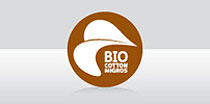
Last year, Migros Bio Cotton was given a new logo and a new design that refers to the appearance of Migros Bio. With this more uniform appearance, Migros makes it easier for customers to orientate themselves and makes the products more visible. Sales rose to CHF 18 million. The producers of Migros Bio Cotton work their fields in a natural way. Parasites are combated with environmentally friendly means, and the fertiliser comes from their own farms. Textiles bearing the Migros Bio Cotton label are free from skin-irritating substances. The range of Migros Bio Cotton includes, in addition to baby and children's clothes, a large selection for adults and household textiles. Migros plans to expand the range substantially in the coming years.
TerraSuisse
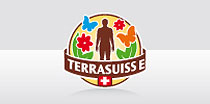
With its TerraSuisse label, Migros has been committed to biodiversity since 2008, together with IP-Suisse and the Swiss Ornithological Station Sempach. The range includes meat, meat products, bread, bread products, flower, dough, rapeseed oil, fruit juices and potatoes, and was supplemented by frozen potato products last year. In 2010 sales of TerraSuisse products dropped by 6% to CHF 600 million due to huge price reductions. More than 14,000 farmers produce for the label in accordance with animal-friendly criteria that are close to nature. Among other things, they create habitats, such as wildflower strips, bushes and trees. Last year, Migros rolled out an iPhone application for TerraSuisse, with which children can learn about animals and their environment in a playful way. Migros also organised event days at IP-Suisse enterprises in cooperation with the WWF.
MSC
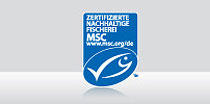
Migros joined the WWF Seafood Group in 2008. Ever since, it has been removing endangered fish species from its product range and expanding its range of fish from sustainably managed stocks. In doing so, it also relies on MSC fish: the blue seal of the Marine Stewardship Council indicates fish and seafood from sustainable, certified fisheries (always wild animals). The MSC logo was redesigned at the start of 2010. Migros has a broad range of MSC fish and seafood: fresh fish in self-service and at the service counters and deep-frozen products and tins in self-service. Within a year, sales in MSC products increased by 30%and stood at CHF 50 million in 2010.
Max Havelaar
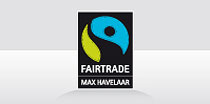
The Max Havelaar Foundation is committed to promoting fair trade and fair employment conditions. Last year, Migros's Max Havelaar products generated total sales of CHF 82 million. A partial range of Migros textiles bears both the new certificate of Migros Bio Cotton as well as Max Havelaar, because ecological and social sustainability go hand in hand. In time for the football world cup 600, footballs were added in spring 2010 to the approx. 16 Max Havelaar product categories available at Migros until then. Migros again donated 160,000 Max Havelaar roses to the annual sale of roses of Brot für alle and Fastenopfer. The proceeds of CHF 800,000 went towards supporting people in developing countries.
FSC
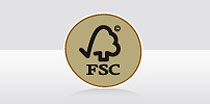
The Forest Stewardship Council (FSC) is an international confederation of environmental organisations, representatives of indigenous peoples and business associations. The FSC label certifies sustainably produced wood products and paper globally. It stands for environmentally friendly, socially acceptable and economically sustainable forestry and guarantees the comprehensive traceability of wood products right to the end user. In 2010 Migros achieved sales in FSC products of CHF 173 million (+20%). The now more than 2'000 FSC products at Migros range from grill accessories to shopping bags through to toilet paper. Furniture at Micasa and construction timber at Do it + Garden Migros also bear the FSC label.
Topten
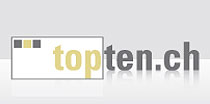
Since the end of 2009, the retailer has been Switzerland's first national retailer to award the Topten label to particularly efficient products. From TV sets to vacuum cleaners through to refrigerators, items can be found bearing the Topten label to help environmentally conscious customers with their shopping. The most energy-efficient 10 per cent of every product category are awarded the label. In total, 62 devices had the Topten label at the end of 2010. The Topten range generated sales of CHF 39 million last year and thereby rose by more than 150%.
approved by climatop
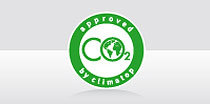
The 'approved by climatop' label has certified the most climate-friendly products within a group since 2008. Goods are certified if - compared to traditional products - significant greenhouse gas savings are implemented from production to disposal. In 2010 new products were added, for instance two peat-free products amongst balcony soils were announced as Migros CO2 Champions. And seven climatop hair sprays with a pump mechanism have been added since last year. Sales in climatop products were CHF 35 million in 2010.
From the region. For the region
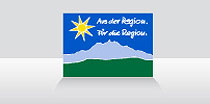
In 1999 Migros Cooperative Lucerne launched the From the region. For the region (AdR) programme. All cooperatives have offered AdR products since 2006; Migros Cooperative Ticino has its own programme for regional produce under Nostrani del Ticino. With AdR, Migros supports local agriculture and simultaneously promotes small businesses focusing on traditional manufacturing methods and specialities. More than 8'000 regional producers are included in the programme. Since introducing AdR, produce is again being cultivated in Switzerland that for a long time had to be imported – for instance, basil and garlic. In most cases the producers' proximity shortens transport routes compared to national and international produce, which reduces CO2 emissions and protects the environment. The awareness rate of AdR has grown increasingly in recent years. It is today Migros's best-known label.
In 2010 Migros generated sales of CHF 746 million with its regional programmes.